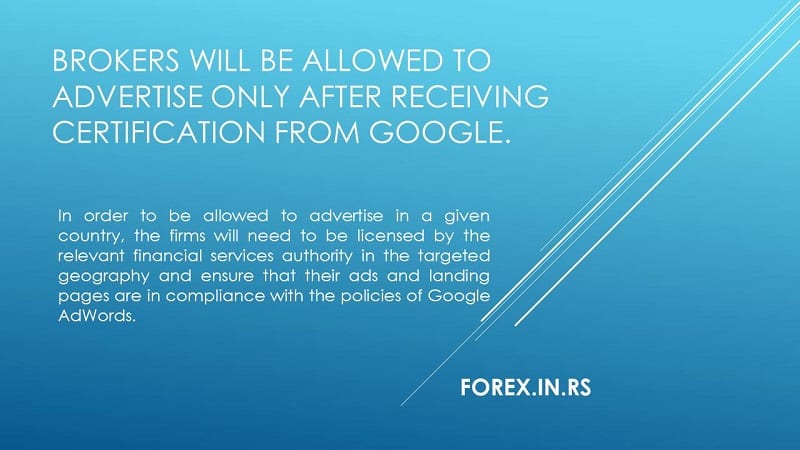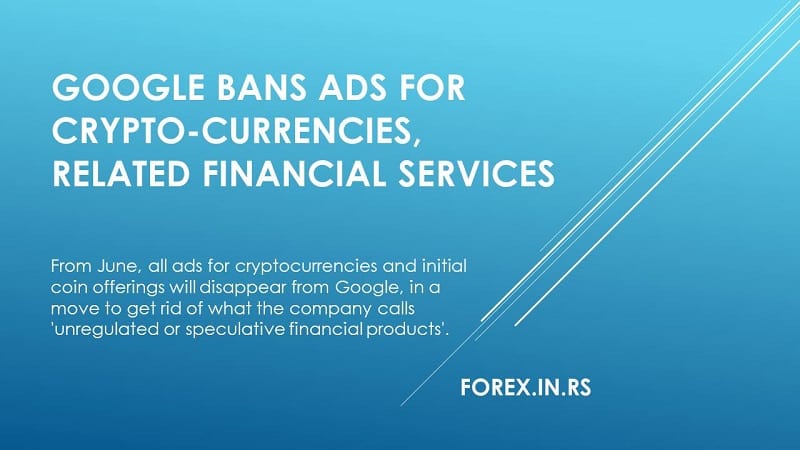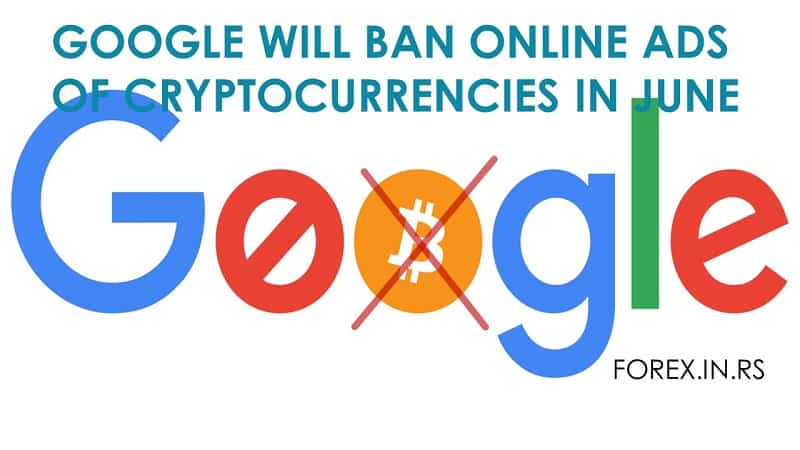Recently, claims have emerged that advertising cryptocurrency ventures is becoming difficult for Google. This follows a move by Facebook to ban all cryptocurrency ads. People are wondering if Google wants to follow a similar route. Sources say Google has not announced any official changes concerning its policies for ICOs and cryptocurrencies. However, the worried voices of the cryptocurrency marketing industry paint a different picture. Google is the internet chief, and it looks like it wants to take over the fast-growing and prominent cryptocurrency industry.
Advertisers are already reporting challenges and difficulties in advertising products that are blockchain and cryptocurrency-oriented.In April 2018., Google bans all cryptocurrency mining extensions from Chrome Store.
The channels showcasing crypto-related content report that they have been banned from YouTube’s platform. The changes in Google’s policy have not yet become official, but many firms and PR agencies have reported a drop in the performance of customers who provide cryptocurrency services. There are cases where the advertisers get their ads rejected and their accounts suspended. Some companies have also reported that they have witnessed a drop in AdWords performance by thousands a day. The drop in the numbers coincided with the adverts that crypto-currency related being regarded as limited during submission.
However, the recent approach to cryptocurrency is not limited to advertisement only. Some cryptocurrency bloggers and shows have also reported that they have found out that their channels have been restricted or even suspended. Some of their restrictions include licensing the live video and demonetizing it. People are still trying to understand why it is happening when Google has not officially announced a policy change. People have come up with several theories, some contradictory and overlapping at the same time.
One such theory is that this is an overreach by Google’s police against malicious ads, crypto scams, and fake news. The other common interpretation is that Google is being meticulous regarding advertisements coming from cryptocurrency advertisers. There are claims that Google’s advertising policy is very clever,e but when it comes to cryptocurrency firms, the approach gets a bit stricter and unforgiving compared to the other industries.
The Prospects of a Ban

The other explanation given by reliable sources and other forum professionals is that it is Google’s intention and effort to restrict advertisements related to cryptocurrency and even go to the extent of blocking them. According to a reliable source, Jason Roy, a Canadian regulator, raised the move to ban cryptocurrency ads four months ago.
The senior investigator said they were pleased with Facebook’s move to ban the ad and ds and hoped that Google enacted the same policy. The move was initially rejected by Google, claiming that it did not want to prevent the whole industry from advertising as much as it was already dealing with fraudulent and misleading ads. However, it looks like it eventually changed its mind.
Sources have confirmed that Google intends to ban ads related to cryptocurrency. Google is banning any advertising related to cryptocurrency. The update is said to go into effect starting June 201. The company is updating its ad policies related to finance to ban advertisements regarding content related to cryptocurrency, including trading advice, wallets, and wallet coin offerings. This means that even those firms with legit cryptocurrency offerings cannot advertise through Google advertisements products.
The company claims that it can’t know the future of cryptocurrency, but it has already seen potential harm and hurt to consumers that the business is causing. It wants the matter to be approached cautiously. As much as the cryptocurrency boom has offered considerable wealth and excitement, it is still unregulated and has given out numerous high-profile scams.
This comes after social media platforms like Facebook banned advertisements related to cryptocurrencies to protect viewers from Ponzi schemes, fraudulent sale of the tokens, and ICO scams. The move came with the report of “bad ads,” a review of the controversial, deceptive, malicious advertisements that Google scrubbed from its massive video, display, and search network. However, this contradicts what the leaders or platforms like Facebook think. The people responsible for creating social media platforms like Facebook have praised cryptocurrency and the technology of blockchain underlying it. It somehow creates juxtaposition since the company they are responsible for has enacted policies that stifle blockchain development and adoption.
A representative of Facebook has said that the policy is broad intentionally as they work to detect misleading and deceptive advertisements better. An advertisement from a cryptocurrency-related company or business might not be allowed on Facebook, even when unrelated to any aspect of cryptocurrency. Facebook, however, is committed to refining and revisiting the ban policy as the signals are enhanced to allow for the advertisement of services and products that are not related to cryptocurrency,cy even from crypto-related companiesInnovativeve startups might have to go elsewhere if the financial watchdogs in the United States and other parts of the world do not develop explicit rules for the cryptocurrency market.
Also, there is irony to Google’s move. As much as the adverts regarding cryptocurrency will end, Google might be starting the development of companies that have invested in thatch use cryptocurrencies directly. There are companies such as Storj, blockchain-based cloud store, get, and the payment platform Veem that Google has financially backed, which will be unable to make advertisements on the search engine as soon as the ban is enacted. The move to ban cryptocurrency advertisements came less than a year after Alphab, the parent company of Google, put investments in Blockchain.info, an online wall based in London. It remains a mystery how services like this will be able to advertise after the ban is enacted.

Google said it took down over 3.4 billion advertisements last year that violated its standards and regulations, almost double the 1.8 billion ads in 2016. Alphabet, the parent company of Google, makes almost 80 % of its revenue from ads, and it is essential to convince advertisers the company’s ecosystem is effective and safe.
The Impact of the Ban
A Cryptocurrency Company’s CEO, Trevor Gerszt, said he is not afraid of the move but does not welcome it. It is frustrating for a legitimate business like Coin IRA, which has done everything to comply with policies and offers legit investment products, to be punished together with the scum ICO schemes (“Exclusive: Is Google Quietly Purging Cryptocurrency Ads and Content? | Finance Magnates,” 2018).
However, the ban on ads may not affect the more reputable and established cryptocurrencies much as they are bound to impact the small businesses that want to use advertisements to gain brand recognition. For the startups, this means the ban will make it harder to get funds through an ICO. For cryptocurrency-related businesses like wallets and crypto exchanges, the move to ban such ads is lousy news. Blockchain-based startups can post their ads on Google if they do not include crypto aspects like wallets, tokens, ICOs, and others. The policy does not apply to technologies related to blockchain, which do not have a relation with ICOs and cryptocurrencies. Still, the advertisements have to adhere to the company’s other policies.
The famous and most significant digital currency in the world, Bitco, has dropped to a month low after this incident. The company slumped to its lowest level less than a month after the claims banning online advertisements promoting initial coin offerings and cryptocurrency. Industrial officials have said that these regulators are required to provide further clarity on the regulations. Bitcoin dropped by 9 % to $8367, the lowest it had reached since January when the company announced that the restriction would start working in June (“Google bans cryptocurrency advertising,” 2018).
Some of the CEOs of crypto-relate businesses have said that they welcome the b, and the people who might be disappointed by the move are the con artists and the scammers. The large amounts of money invested in ICOs are based on relationships and legitimate and excellent connissuconnoisseurswsectionockchain and crypto funds. Some CEOs argue that the ban will bring a positive transformation to the industry and will assist in cleaning garbage (“Exclusive: Is Google Quietly Purging Cryptocurrency Ads and Content? | Finance Magnates,” 2018). The CEOs of Delta and CrowdfundX are not worried either. They say Google wants a better experience of advertisements for the viewer, rs and the cryptocurrency community as a financial market also wants legitimacy. The restrictions are part of filtering illicit businesses and activities from genuine ones with innovative products.
The market will eventually become stable, and the activity will be removed. The company going through ICOS should concentrate on showing its value through evidence and creating innovative and great products. In a way, it is not strange that the legiblockchain-based startups are not worried about the ban. Several startups have to fend off investors like Gems and Theta, who have canceled ICOs recently because they raised too much revenue in the private pre-sale. As much as some unlucky startups will be hurt by being unable to advertise their sales of tokens, it looks like the blockchain space has become so hot that even the general ban will not kill or hinder it. It may just make it slow for some time. Some experts see.
Where To?
This is a question that cannot be answered for some time. The world is waiting for clear regulatory rules and guidelines on ICOs and cryptocurrency. As much as the likes of the SEC are pioneers in this space, we might experience constant attacks promoting cryptocurrencies and ICOs on several online platforms. Unless there are guidelines and firm rules that will protect many viewers and users from misleading opportunities of investments and ICO scams, extreme sanctions will remain. Otherwise, the efforts to ban these advertisements will go to waste if the guidelines are unclear and strict.

























